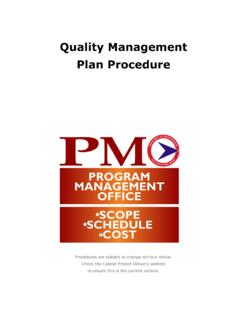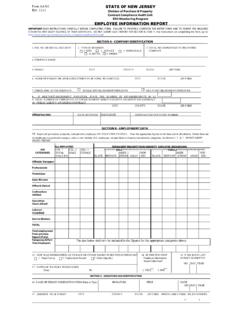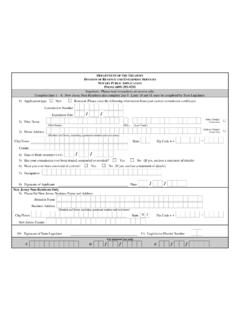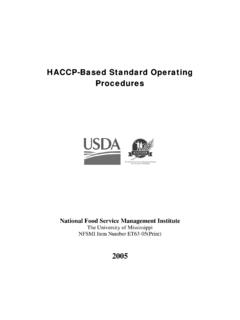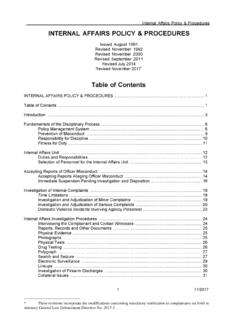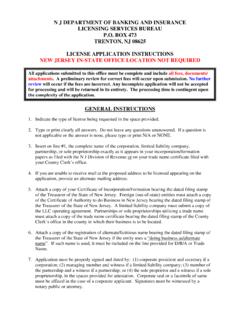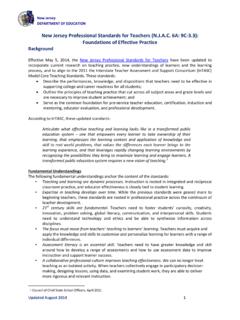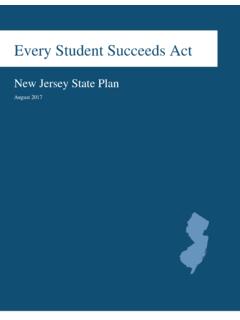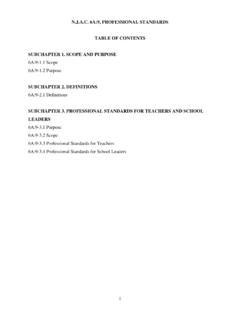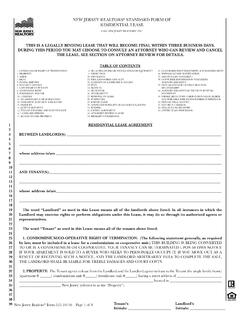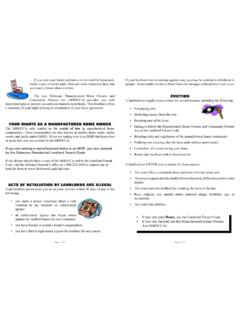Transcription of TRUTH IN RENTING - State
1 NJ DEPARTMENT OF COMMUNITY AFFAIRSDIVISION OF CODES AND STANDARDSLANDLORD/TENANT INFORMATION SERVICE101 South Broad StreetPO Box 805 Trenton, NJ OFCommunityAFFAIRSCADA guide to the rights and responsibilities ofresidential tenants and landlords in New JerseyRENTING101 South Broad Street,PO Box 805 Trenton, NJ view the complete DCA Programs Book, please Jersey Department ofCOMMUNITY A FFA I R SDEPARTMENT OFCommunityAFFAIRSCADTRUTH INPublished by the NEW JERSEY DEPARTMENT OF COMMUNITY AFFAIRSTENTH EDITIONJUNE 2010 2010 State of New Jersey,Department of Community AffairsGreetings from the DEPARTMENT OF COMMUNITY AFFAIRSC ongratulations on RENTING your home in New Jersey! The Department of Community Affairs is here to help with this new responsibility by providing you with important information about RENTING in our State . The TRUTH in RENTING Act was signed in 1976. Since then, DCA has produced this booklet as a reference guide to help you understand your rights as a renter, and the responsibilities and rights of landlords.
2 This booklet outlines information about your lease, security deposit, discrimination, safety, health and many other issues related to your rented home. It is updated annually so you have the most current information on laws, regulations and other information pertaining to RENTING in New Jersey. We hope you find this booklet a valuable resource and encourage you to read through it and refer to it often. Congratulations again on RENTING your new home in New Jersey. TABLE OF CONTENTSINTRODUCTIONA bout the TRUTH -in- RENTING Act 1 About the Current Statement 1 Special Note on Applicability 1 THE LEASEG eneral Provisions 2 Mobile Home Leases - Private Residential Leasehold Communities 3 Public Housing Leases 4 Renewal and Breaking 4 Notice to Terminate the Lease Agreement 6 Termination of the Lease Due to Domestic Violence 6 Service Members Civil Relief Act 8 Right of Entry 8 Security Deposits 9 Pets 12 Discrimination 12 Modification of the Rental Premises for People with Disabilities 13 Consumer Fraud Protection 13 Disposal of Personal Property Left By Tenant Once the Tenant Has Moved from the Premises 13 Credit Checks and Background Checks 14 RENT Senior Citizens Grace Period 14 Nonpayment and Distraint 15 Rent Increases and Rent Control 15 Public Financed and Subsidized Housing 16 Property Tax Rebate for Tenants 16 New Jersey Homestead Property Tax Credit 17 HABITABILITYI
3 Dentity of Landlord 17 Health, Safety and Maintenance Standards 18 State Inspection and Enforcement 18 Child Protection Window Guards 19 Carbon Monoxide and Smoke Detectors 19 Locks 20 State Heat and Utility Requirements 20 Rent Receivership for Substandard Housing and Diversion of Utilities 21 Local Board of Health 21 Repair and Deduct and Rent Withholding 21 Multifamily Housing Preservation and Receivership 22 Public Housing Maintenance 23 Federal Lead-Based Paint Disclosure 23 Lead Based Paint 24 Posting of Drinking Water Test Results 25 Flood Plain Notification Requirement 26 Crime Insurance Information 26 EVICTION Self Help Evictions 26 Causes for Eviction 27 Evictions for Owner-Occupied Two-and Three-Family Dwellings 33 Rooming and Boarding House Evictions 33 Public Housing Evictions 34 Penalties for Eviction Law Violations 34 Reprisal - Civil Rights of Tenants 34 Procedures for Recovery of Premises 35 Evictions Due to Foreclosure 35 Notice
4 Requirements to Tenants Prior to the Transfer of Title Due to a Foreclosure Action 36 Notice Requirements to Tenants After the Transfer of Title Due to a Foreclosure Action 36 SENIOR CITIZENS AND DISABLED TENANTSS enior Citizen and Disabled Protected Tenancy 37 Tenant Protection Act of 1992 37 Disclosure Statement to Senior Citizen Housing Residents 38 ENDNOTES FOR TRUTH IN RENTING 38 NEW JERSEY JUDICIARY OMBUDSMAN OFFICES 41 ANTI-DISCRIMINATION OFFICES 42NJ LEGAL SERVICES PROGRAMS 42 APARTMENT HOUSE SAFETY TIPS 44 OPERATION IDENTIFICATION 45 ADDITIONAL AGENCIES AND ORGANIZATIONS 46 ORDER FORM 49 INTRODUCTIONABOUT THE TRUTH IN RENTING ACT The TRUTH in RENTING Act was signed into law on February 19, 1976, as Chapter 310 of the New Jersey Public Laws of 1975.
5 The Act requires the New Jersey Department of Community Affairs to prepare, distribute, and update annually a statement in English and in Spanish of the established rights and responsibilities of residential tenants and landlords in the State . The Act calls for distribution of the statement to all tenants with a rental term of at least one month living in residences with more than two dwelling units (or more than three if the landlord occupies one). The landlord is required to give a copy of the current statement to each tenant when a lease is entered into, and to make available the current statement in the building where the tenants can easily find it. The landlord should keep documentation or receipts verifying distribution of the TRUTH in RENTING statement to new landlord who does not properly distribute the statement is subject to a penalty of up to $ for each offense. Enforcement of this statute is handled through the Superior Court, Special Civil Part, Landlord-Tenant Section of the county where the building is located or of the county where the defendant resides.
6 ABOUT THE CURRENT STATEMENT The TRUTH in RENTING Statement is available on our website at: The Landlord-Tenant Information Service does not have jurisdiction over the administration of the courts, nor can the Service render legal advice. Any change in the size of print or content of the booklet that is not approved in writing by the Landlord-Tenant Information Service will be considered a violation of the Act. The deadline for distributing the current statement is 30 days after the Department of Community Affairs makes it available for distribution. The statement is based on existing State laws, regulations and court cases. Its purpose is for information and reference only, not for legal advice. It is not a complete summary of all laws and court decisions that concern landlord tenant relations. Any person who plans to take a legal action in a landlord-tenant dispute may wish to consult the appropriate enforcing agency, a county legal services agency, a private attorney, or an owners , tenants , or mobile home organization (see back of booklet for address and telephone listings).
7 SPECIAL NOTE ON APPLICABILITYThe information contained in this Statement should be generally useful to all residential tenants and landlords in New Jersey. However, not all the laws apply to all types of buildings. A person can find out if a law applies to his or her situation by carefully reading the section describing that law. If it does not say that there are exceptions, then the law applies to all residential tenants and landlords. 12 THE LEASEGENERAL PROVISIONS A landlord-tenant relationship is formed when a landlord allows another person to use a dwelling unit for a specified period of time in return for rent. A dwelling unit may be an apartment, a house, a room or a mobile home or mobile home space. Parties to a lease must be at least 18 years old and mentally competent. (1) A lease may be either oral or written. If written, it must be in plain language. (2) This means that it must be written so that an average person can understand TRUTH -in- RENTING Act (3) provides that any written lease entered into or offered to a tenant must not violate any State laws in effect at the time the lease is made.
8 Provisions of a lease must be reasonable. Once a lease has been made, neither party can be made to accept any new agreements while it is in effect. Any fees that the landlord intends to charge should be clearly stated. This can prevent confusion and possible disputes later. A lease may permit a late charge when the rent is not paid by a certain date, and may also provide for payment by the tenant of the landlord s attorney fees and court costs in the event of eviction for non-payment of rent or for other causes. The written lease must expressly permit a landlord to recover reasonable attorneys fees and include late fees as a part of rent in order for a judge to consider those expenses as additional rent in a summary dispossess proceeding. (4) The tenant should read the rental agreement before signing. It is advisable for the tenant to get a copy of the lease for his or her own records at the time that it is signed. If a new landlord takes over the building, both the new landlord and the tenant must honor the pre-existing rental agreement until it expires.
9 Later disputes can be avoided if tenant and landlord (or landlord s representative) walk through the unit together and make a list (which both should sign) of all items that are in need of repair or replacement. Neither a tenant nor a landlord has the right to damage the other s property and either can be sued by the other for any property damage. Some provisions found in leases are a matter of preference by the landlord. Examples of such provisions are: 1) A landlord may restrict subletting or assigning of the leased unit; 2) A landlord may forbid or limit the keeping of domesticated animals; however, in senior citizen housing projects or senior citizen planned real estate developments (senior citizens must be 62 years of age or older and shall include a surviving spouse if that surviving spouse is 55 years of age or older), having three or more rental units, a landlord must permit domesticated animals unless they become a nuisance or the tenant does not follow rules and regulations concerning care and maintenance;(5) 3) A landlord may require tenants to give copies of keys; and 4) A landlord may require a tenant to obtain renter s liability insurance.
10 If a lease contains provisions that are against State statutes, local ordinances or governmental regulations, or a tenant feels a provision is unreasonable, the tenant has the right to enter an action in Superior Court, Law Division, Special Civil Part, of the county where the building is located asking the court to remove the provision from the lease. (6) If a tenant and landlord cannot agree on a lease provision prior to 3acceptance of the document, the tenant may pursue a court action for clarification of the provision, or the landlord may take the tenant to court in an eviction action, where the judge would decide the issue. Although not required by all municipalities, where required it is the responsibility of the landlord to obtain a certificate of occupancy before a new tenant moves into a landlord may not forbid or prevent installation of cable service or unreasonably restrict the installation of an individual satellite dish and may not require advance payment for permission to install it.
